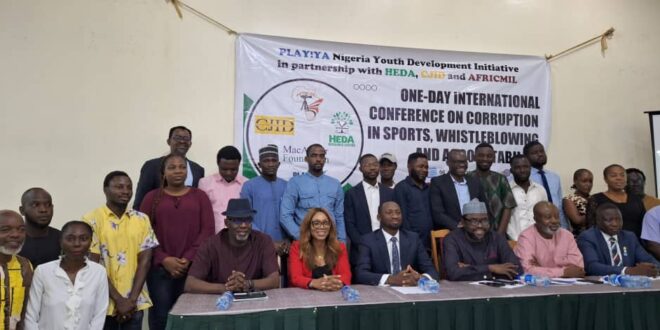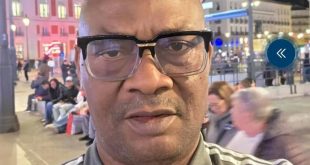Sports enthusiasts have called on all stakeholders in the sector to uphold the virtues of transparency and accountability in order to ensure corruption is kicked out of the industry.
The reports that this was the position of keynote speakers at a one-day International Conference on Corruption in Sport, Whistleblowing and Transparency on Thursday in Abuja.
The conference was organised by Africa Centre for Media Information and Literacy (AFRICMIL), Centre for Journalism Innovation and Development (CJID), HEDA Resource Centre and PLAY!YA Nigeria.
The panelists spoke on different issues including; the identification and prosecution of corruption in sports and beyond, the measurement and management of the multiple sports governance crisis and how journalists and whistleblowers can expose corruption in sport.
They explored the links between corruption and underdevelopment in African sports and wider society.
They also specified the role of sports community, civil society, media, whistleblowers and other stakeholders in curbing the menace.
Beverly Agbakoba-Onyeijanya, a Sports, Entertainment and Technology legal practitioner noted that the sports industry had been so heavily politicised which has led to alot of corruption in the sector.
“You have a situation where member states of various Federations are involved in tough wars over who has the right to vote, with elections being a major source of contention and dispute in the sports industry.
“For example, we’ve seen the rancour that have turn apart the Basketball Federation in Nigeria with factions, and of course with this comes the possibility of bribery, corruption, inducements, mismanagement of funds, and so on,” she said.
She said given the humongous amount of money involved in the prosecution of sports, there was the need for the anti-graft agencies to devote special attention to financial crimes in the sports industry.
She stressed that the establishment of an anti-corruption sports desk in agencies such as the Economic Financial Crimes Commission (EFCC), ICPC, etc. was of immense importance, so as to check mate the excesses of sports administrators in the country.
In his reaction, Usman Kaltungu of the EFCC explained that the Commission’s powers to fight sports related corruption cases headlong in the country was been hampered by undue interference from International Sports organisations such as FIFA, FIBA and the likes.
Francis Obih, President, Badminton Federation of Nigeria (BFN) who shared some of his personal experiences in his years of sports administration and management in the country, said the issue of favoritism and sentiments must be stamped out from sports.
“You don’t bring sentiments into certain decisions when you are running sports.
“As far as I am concerned, it doesn’t matter where you are coming from, once you are going out to represent Nigeria, you are representing the country and not any ethnic group or a particular religion.
“So, such things should be taken away from sports, it doesn’t matter whether you are my brother or not, it should be purely based on merit and competence.
“Also one of the disturbing areas is also the sexual harassment of female athletes by their coaches.
“This is a no go area for me and the height of indiscipline to have officials, the coaches or technical personnel to have any sexual relationship with their athletes.
“We must do everything to stop it because it hampers the performance of the athletes,” he said.
Obih stressed that to have an enabling environment for proper sports development, there was a need to have a critical mass.
He said every stakeholder, be it administrators, the ministry, journalists, etc must come together, join hands and set certain ethical standards.
“These standards should guide the growth and development of sports in the country, in order to bring corruption to its barest minimum.
“No one person cannot do it alone, all hands must be on deck and in agreement, even though in every group, there are always some bad eggs and that’s the truth.
“However, we must find a way of isolating those elements and minimise the damage that they can do, so that the whole body is not seen in a bad light,” he said.
Also speaking via zoom, an Investigative journalist based in Germany, Grit Hartmann, pointed out that journalists outside the shores of the African continent were not oblivious of corruption stories from the African continent, especially from Nigeria.
She therefore suggested the need for synergy and transnational corporation, adding that the issue of corruption in sport in Nigeria and the African continent at large was a systemic problem.
Stanis Elsborg, a Senior Analyst also based in Germany, however argued that corruption in sports was not limited to Africa, stressing that Europe and other blocs of the globe are also susceptible to corruption tendencies in the area of sports.
Joshua Umeifekwe, a professor at the University of Nigeria, Nsukka, said the essence of measuring and managing multiple sports governance crisis was to maintain the credibility, accountability and integrity of the sector and retain transparency.
“Transparency like you know ensures trust and so what we are saying is that there is a need to measure the nature of crisis that we have.
“For one to talk about ways of managing the crisis, you need to have an assessment of these crisis.
“Some of the ways include; collecting qualitative data, running a survey, interviews, to mention a few.
“Having done this, we must ensure we manage the crisis by ensuring transparency and ethical standards are followed and maintained as well as ensuring that all key stakeholders are carried along in the business of sports,” he said.
Chido Onumah, Coordinator, AFRICMIL and Oluwashina Okeleji, a sports journalist for BBC Sports, among others also made their submissions on various thematic areas, adding that the role of whistleblowers in the sports sector cannot be overemphasised.
They stressed that for sports to grow, there was a need to have whistleblowers to expose some of the ills and corruption going on in the sector because they were individuals who purely and genuinely care about the growth and development of the industry.
They also called for the establishment of a legislation that covers and protect whistleblowers as well as investigative journalists in the country, stressing that the dangers associated with the profession was quite enormous and not safe. (NAN)
 GongNews … truth in defense of a just society
GongNews … truth in defense of a just society




